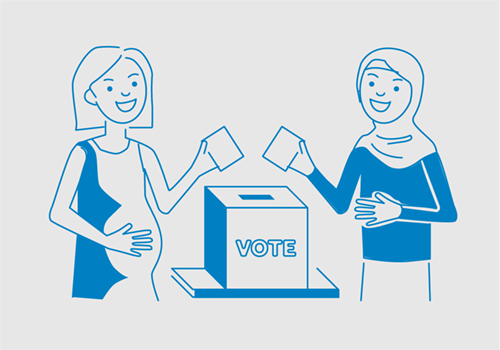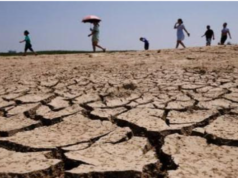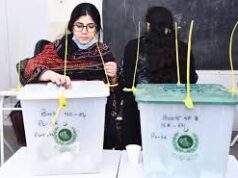Bridging the Gender Gap: Strategies for Promoting Equal Participation in Electoral
Processes
Subject: Complaint under Section 15 of Election Act 2017, read with Section 206 & 217(1) of said Act and Section 6 of Code of Conduct on violations by certain Political Parties in General Election 2024
Aurat Foundation (AF), a civil society organization working on the rights of women and accountable governance, has undertaken an analysis of 8 political parties contesting election for the National Assembly (NA) and four provincial assemblies, to see whether political parties have complied with the provisions of Elections Act 2107, safeguarding women’s rights, or not. We are dismayed to find that some political parties have not observed the legal requirement under section 206 of the said act and section 6 of the Code of Conduct for political parties, to award minimum of 5% tickets to women candidates on general seats. On the other hand, some political parties complied with the said sections, which is a commendable gesture towards women’s political participation. We would like to bring the following facts to the knowledge, attention and immediate action of the ECP:
1. Certain political parties have complied with Section 206 of the Elections Act 2017, and have awarded the minimum required 5% party tickets to women on general seats (Analysis provided below)
2. Certain political parties have violated Section 206 of the Elections Act 2017, and have awarded less than the minimum required 5% party tickets to women on general seats, which require strict legal action against these political parties, as per Section 217(1) of the said Act. (Analysis provided below)
3. It is to be noted that ECP has not uploaded separate party lists of the women candidates on general seats on its website to date, as required by the ECP press release to the political parties dated 14-01-2024. Therefore, AF’s analysis is based on the scrutiny of over 1,000 Forms-33 of each and every constituency of the National Assembly and Provincial Assemblies of Pakistan, with the possibility of a slight margin of error. In case of any slight error, the ECP evaluation of the compliance to Section 206 will be considered final
4. Political parties submit an affidavit during the process of election schedule that they have complied with the provisions of the Act, including Section 206. If they have not met the minimum requirement of awarding 5% tickets to women on general seats, this should be considered a case of ‘false declaration of information’.
5. Aurat Foundation wrote a letter to the Honorable Chief Election Commissioner (CEC), on 31st January 2024 on this issue, requesting for an appropriate legal action. An official of the ECP spoke to an AF official and briefly discussed the issue the next day on 1st February 2024 (letter sent to ECP attached).
6. Aurat Foundation previously issued a press release on this issue on 16th January 2024 requesting the CEC to look into the matter (PR attached). Please find below the findings of the analysis of each assembly. In the National Assembly, the analysis shows that PPPP, Jamaat-e-Islami (JI), Awami National Party (ANP), Tehreek Labbaik Pakistan (TLP), JUI-F and BNP have not met the requirement of awarding at least 5% party tickets to women on general seats.
The ECP is requested to take cognizance of the matter. See for details:
National Assembly Share of Women’s Tickets
General Elections 2024
National Assembly: Women contesting General Seats on Political Party Tickets
Political Parties Male Candidates Female Candidates Total number of tickets Female %age of total no of tickets
| MQM | 66 | 07 | 73 | 9.6% |
| PML-N | 189 | 16 | 205 | 7.8% |
| PPPP | 234 | 11 | 245 | 4.5% |
| JI | 219 | 10 | 229 | 4.4% |
| ANP | 59 | 02 | 61 | 3.3% |
| TLP | 218 | 02 | 220 | 0.9% |
| BNP | 11 | 00 | 11 | 00% |
| JUI(F | 127 | 00 | 127 | 00% |
In the Punjab Assembly, the findings are that PML-N, PPPP, JI, MQM, and TLP have not met
the requirement of awarding at least 5% party tickets to women on general seats. See Table 2 for
details:
Punjab Provincial Assembly: Women contesting General Seats on Political Party Tickets
| Political Parties | Male Candidates | Female Candidates | Total number of tickets | Female %age of total number of tickets |
| MQM | 12 | 0 | 12 | 0% |
| PML-N | 274 | 04 | 278 | 1.4% |
| PPPP | 248 | 12 | 260 | 4.6% |
| JI | 268 | 07 | 275 | 2.5% |
| ANP | 01 | 01 | 03 | 50% |
| TLP | 288 | 01 | 289 | 0.3% |
| PMML | 214 | 14 | 228 | 6.1% |
| JUI(F) | 114 | 07 | 121 | 5.8% |
In the Sindh Assembly, the findings are that MQM, ANP, and TLP have not met the
requirement of awarding at least 5% party tickets to women on general seats. See Table 3 for
details:
Sindh Provincial Assembly: Women contesting General Seats on Political Party Tickets
| Political Parties | Male Candidates | Female Candidates | Total number of tickets | Female %age of total number of tickets |
| MQM | 86 | 04 | 90 | 4.4% |
| PML-N | 43 | 07 | 50 | 14% |
| PPPP | 123 | 07 | 130 | 5.4% |
| JI | 92 | 06 | 98 | 61% |
| ANP | 28 | 00 | 28 | 00% |
| TLP | 111 | 03 | 114 | 2.6% |
| GDA | 68 | 09 | 77 | 11.7% |
| JUL(F) | 43 | 08 | 51 | 15.7% |
In the Khyber Pakhtunkhwa Assembly, the findings are that PML-N, MQM, JI, and JUI-F
have not met the requirement of awarding at least 5% party tickets to women on general seats.
See Table 4 for details:
Khyber Pakhtunkhwa Provincial Assembly: Women contesting General Seats on Political Party Tickets
| Political Parties | Male Candidates | Female Candidates | Total number of tickets | Female %age of total number of tickets |
| MQM | 06 | 00 | 06 | 00% |
| PML-N | 86 | 04 | 90 | 4.4% |
| PPPP | 85 | 05 | 90 | 5.6% |
| JI | 95 | 04 | 99 | 4.0% |
| ANP | 85 | 05 | 90 | 5.6% |
| TLP | 45 | 03 | 48 | 6.3% |
| QWP | 18 | 02 | 20 | 10% |
| JUI(F) | 106 | 03 | 109 | 2.8% |
| PTI(P) | 60 | 6 | 72 | 8.3% |
In the Balochistan Assembly, the findings are that PML-N, MQM, PPP, ANP, TLP, and JUI-F
have not met the requirement of awarding at least 5% of party tickets to women in general seats.
See Table 5 for details:
Balochistan Provincial Assembly: Women contesting General Seats on Political Party Tickets
| Political Parties | Male Candidates | Male Candidates | Male Candidates | Female %age of total number of tickets |
| MQM | 03 | 00 | 03 | 00% |
| PML-N | 39 | 01 | 40 | 2.5% |
| PPPP | 45 | 02 | 47 | 4.3% |
| JI | 38 | 02 | 40 | 5.0% |
| ANP | 21 | 00 | 21 | 00% |
| JLP | 21 | 01 | 22 | 4.5% |
| BNP | 34 | 02 | 36 | 5.6% |
| JUI(F) | 45 | 00 | 45 | 00% |
This is to be noted that Section 206 of the Elections Act 2017, needs to be read with Section 6 of the Code of Conduct for Political Parties, which clearly states that political parties shall award a minimum of 5% general seat tickets to women in each assembly, including the National Assembly and the four provincial assemblies of Pakistan. The punishment for violation of any provision of the Elections Act 2017 by the political parties is provided in Section 217 of the said Act.
Unfortunately, the findings indicate that political parties have shown apathy towards women politicians/candidates and are not ready to mainstream their participation in the electoral process. This is to be noted that allotting 5 percent general seat tickets to women is a legal requirement, and, if not complied by political parties, they cannot be given election symbols, and cannot contest elections as a political party.
It cannot be presumed that political parties are not aware of this obligation for two reasons: firstly, that all parties submit an affidavit to ECP that they have allotted 5% tickets to women, and; secondly, because most of the mainstream parties including PPPP, PML-N, PTI, ANP and even TLP fulfilled this requirement in General Election 2018.
We request the Election Commission of Pakistan to take notice of this violation of the Election Act 2017 and Code of Conduct for the Political Parties, because the 5% restriction is already a low ceiling, and if parties continue to show disregard to women in providing them opportunities to mainstream them into electoral processes, it would mean denying half the population of their due fundamental rights under the Constitution of Pakistan.
Aurat Foundation, through this complaint, requests the Election Commission of Pakistan to take cognizance of the matter with immediate effect and take strict action under Section 217 and other provisions of laws, against the political parties who have defied the provision of the Election Act 2017 and the Code of Conduct for Political Parties.
It is high time that the Election Commission of Pakistan accords the importance to women that they deserve and, enforces its laws on all political parties, without any discrimination. Ensuring women’s participation in electoral processes contributes to a more representative government. When women are part of decision-making bodies, diverse perspectives are considered, leading to more inclusive and comprehensive policies. Studies suggest that societies benefit from gender equality. When women participate in electoral processes, it can positively impact social and economic development, leading to more stable and prosperous communities.








